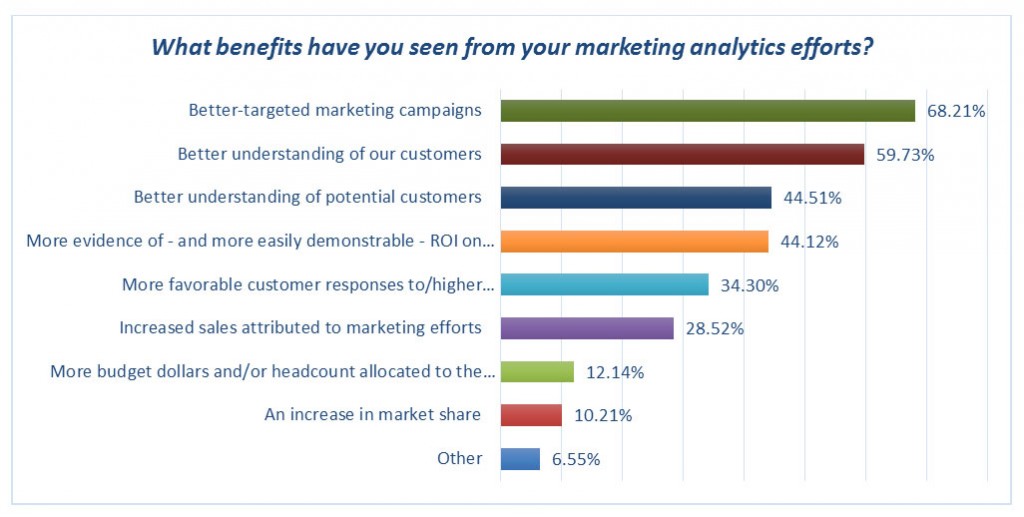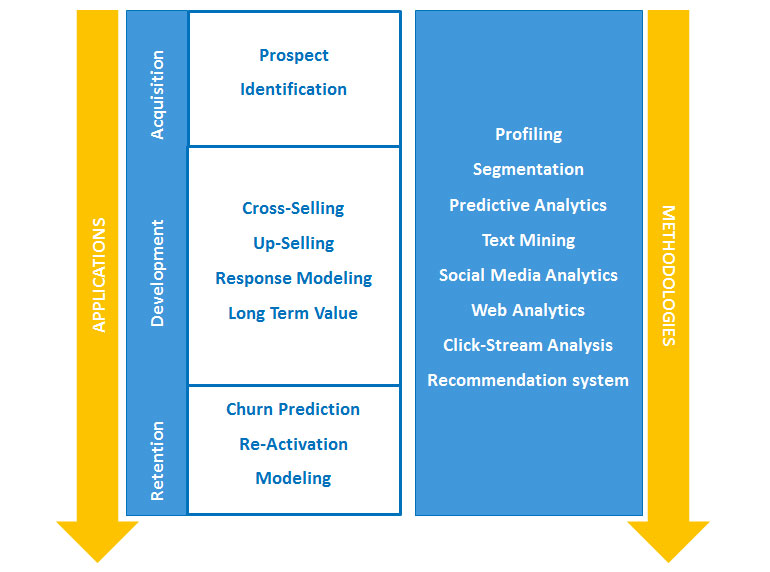What is ICMA?
The ICMA is the IÉSEG Center for Marketing Analytics of IÉSEG School of Management (Paris & Lille, France). It is a knowledge hub formed by a team of academic experts with a proven track record in the fields of marketing analytics in the field of customer relationship marketing (aCRM) and database marketing that aims to support teaching, research and business projects.
Our mission is to establish synergetic, innovative projects, offering innovative solutions to real-life business needs related to marketing analytics and transfer expertise to students, professionals and organizations. We intend to bridge the gap between academic research and business needs establish durable research collaborations between academics active in research in the fields of database marketing, customer intelligence, digital analytics, big data analytics or analytical CRM, and businesses in need of solutions related to one of these topics.
These collaborations could take one of, but are not limited to, the following forms:
- Ad hoc, joint research projects around a specific objective
- Single- or multiyear company sponsorship of Ph.D. research
- Specialized training / Executive education with specialist courses related to database marketing
- Guidance of student projects
ICMA Expertise
The core competences of ICMA lie in the realm of marketing analytics, which intends to deploy customer data and analytical methods to enhance marketing efforts’ productivity. It constitutes a subdiscipline in marketing that has evolved enormously over the past 20 years and today constitutes an umbrella term of many closely related concepts:
- Analytical CRM
- Customer Intelligence
- Customer Analytics
- Social media analytics
- Predictive marketing analytics
- Data mining for marketing
- Big Data Analytics for Marketing
- Digital analytics
ICMA activities
The ICMA activities are organized around three pillars:
Research
- A research agenda focusing on innovative methodologies and applications in marketing analytics.
Training & Education
- A large portfolio of courses related to customer analytics and digital marketing offered to IÉSEG master students: Customer Intelligence, CRM, Search Engine Marketing & Online Advertising, …
- Advanced MSc in Digital Marketing & CRM
- Advanced MSc in Big Data Analytics for Business
- Executive education and In-company training (open and tailor-made programs) and to other schools
Company collaborations
- Innovative research projects in collaboration with companies in different sectors (e-commerce, insurance, financial services, retail etc.)
Why Marketing Analytics?
Marketing analytics recognizes the value of a company’s data. All information that a company collects about its customers – transactional data, profile information such as demographical and psycho-graphical information, customer communication, web site usage etc. can potentially be deployed to increase the ROI of your marketing efforts by making them more effective. Many companies have […]
Marketing analytics recognizes the value of a company’s data. All information that a company collects about its customers – transactional data, profile information such as demographical and psycho-graphical information, customer communication, web site usage etc. can potentially be deployed to increase the ROI of your marketing efforts by making them more effective. Many companies have access to valuable data. Only few use it to their full benefit.
As the following figure shows, taken from a recent industry survey by Forrester Research, many drivers motivate companies to adopt marketing analytics, but the ultimate shared end-goal of marketing analytics is an increase of marketing efficiency.

Source: Forrester Research, 2012, Q1 2012 Global Customer Analytics Online Survey (Base: 90 customer analytics professionals)
Through advanced analytical methods and the use of customer data, it aims at making intelligent selections of customers so that marketing actions can concentrate only on those customers that are most likely to respond in a desired way to a marketing campaign. Instead of wasting money on unprofitable or uninterested customers, marketing budgets can be spent where they matter the most.
The benefits of marketing analytics have been proven in numerous academic studies, and are now universally accepted in industry. This is shown in the following figure, showing the perceived benefits of marketing analytics in a research survey targeted at marketing professionals:

As shown, marketing analytics have a major role to fulfill in making marketing efforts more relevant and personalized towards customers.
Due to widespread usage of CRM systems and especially the role of the Internet for commerce and marketing, more and more diverse forms of data related to customer behavior becomes available. This triggers a vivid need for adapted big data methods that enable marketing analysts to effectively store, handle, integrate and analyze these huge quantities of both structured and unstructured data. Big data technology and analysis techniques and marketing analytics are rapidly developing in tandem nowadays. As a recent Accenture study demonstrated, the major expectation of big data technology managers foresee in the near future are improved customer relationships.

Source: Accenture, 2014, Accenture Big Success with Big Data Survey, April 2014
Applications & Methods
During recent years, the field of marketing analytics has substantially evolved on two dimensions. First, new methodologies have been developed and rigorously tested in the conventional disciplines of database marketing. Examples of these innovative techniques are ensemble learning, Bayesian modeling or text mining. Second, the principles of marketing analytics have found their way into new […]
During recent years, the field of marketing analytics has substantially evolved on two dimensions. First, new methodologies have been developed and rigorously tested in the conventional disciplines of database marketing. Examples of these innovative techniques are ensemble learning, Bayesian modeling or text mining. Second, the principles of marketing analytics have found their way into new domains and applications, such as direct marketing for non-profit, social media marketing, search engine marketing and mobile marketing. The key word within these new developments is creativity. Creativity is found in the methods that analysts use and on the application side. The ICMA focuses on both aspects, and it fills a large gap in the business and academic environment by digging in into the hottest trends in database marketing!

While the intensified use of the Internet as a marketing channel has widened its scope, disciplines within marketing analytics are traditionally categorized along three pillars of Customer Relationship Management (CRM) following the customer lifecycle.
• Customer acquisition refers to the persuasion of individuals or businesses to engage in a relationship with the company, i.e. to become customer
• Customer development aims at a widening or deepening of the relationship with the customer. In the former case, the customer buys other products and services within the range of the company, while in the latter, the customer purchase more or more expensive products
• Customer retention comprises efforts to ensure that customers continue to do business with the company.
Marketing Analytics Applications / MethodologyExplanation
| Prospect Identification | The process of managing customer prospects and inquiries in order to extend the current customer base |
| Cross-Selling | The task of selling additional products or services to existing customers in order to extend their current product portfolio |
| Up-Selling | The task of extending/replacing existing products in a customer’s product palette by an upscale extension/version |
| Response Modeling | The process of sending out targeted mailings in order to increase the response rate on catalogue campaigns |
| Lifetime Value | The process of estimating the present value of future cash flows that a customer will generate according to the customer’s relationship |
| Churn Prediction | The process of identifying whether or not a customer will leave the company |
| Re-Activation Modeling | The process of activating “sleeping” customers or recapturing lost customers out of the database |
| Profiling | The process of describing different customer groups (e.g. complainants versus non-complainants) based on available customer information |
| Segmentation | The process of splitting up the customer database in homogeneous groups of customers in order to set-up different marketing actions to each of them |
| Predictive Analytics | The task of predicting future customer behavior based on replicating past customer behavior assuming that different types of customers behave equally over time |
| Text Mining | The process of converting and analyzing textual customer information like customer emails into a quantitative format in order to extract relevant knowledge out of it |
| Social Media Analysis | The task of scraping, converting and analyzing data from social media like Twitter, Facebook, Linkedin, product review websites, etc. to gain customer knowledge. |
| Web Analytics | The process of using website usage data like browsing paths, visitor origin data, sales funnels, etc. to optimize the functioning of a website resulting in increased sales |
| Clickstream Analysis | The task of analyzing website visit and page request server log data in order to profile web users resulting in an optimized website and advertising personalization |
| Recommendation system | The task of employing past behavioral data to personalize customer offerings |
